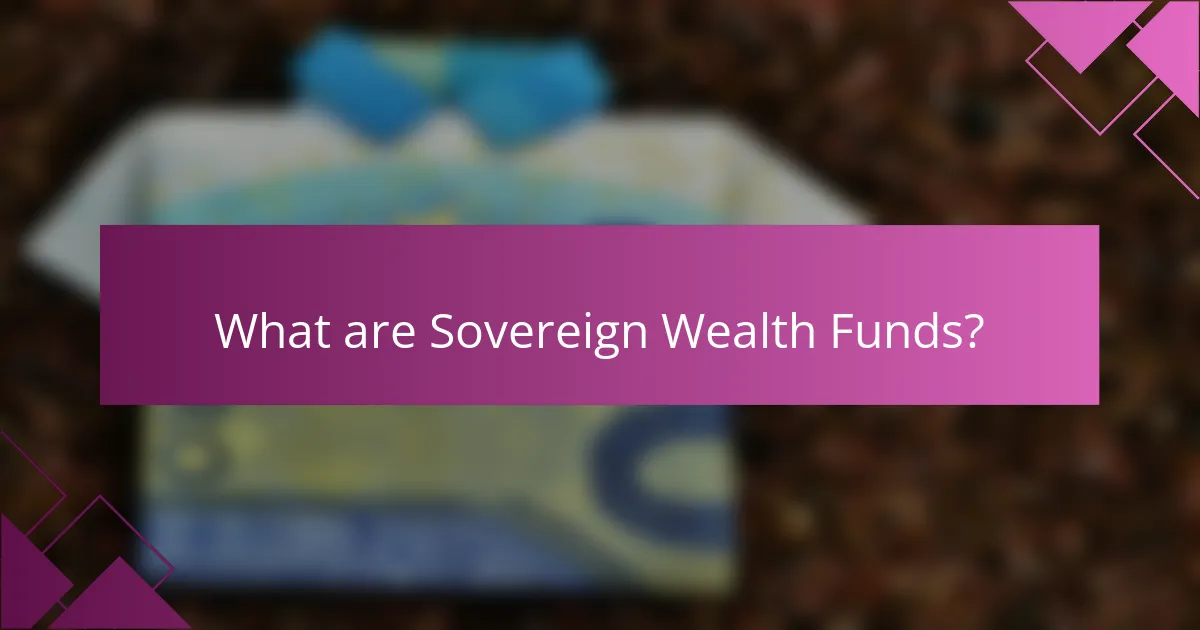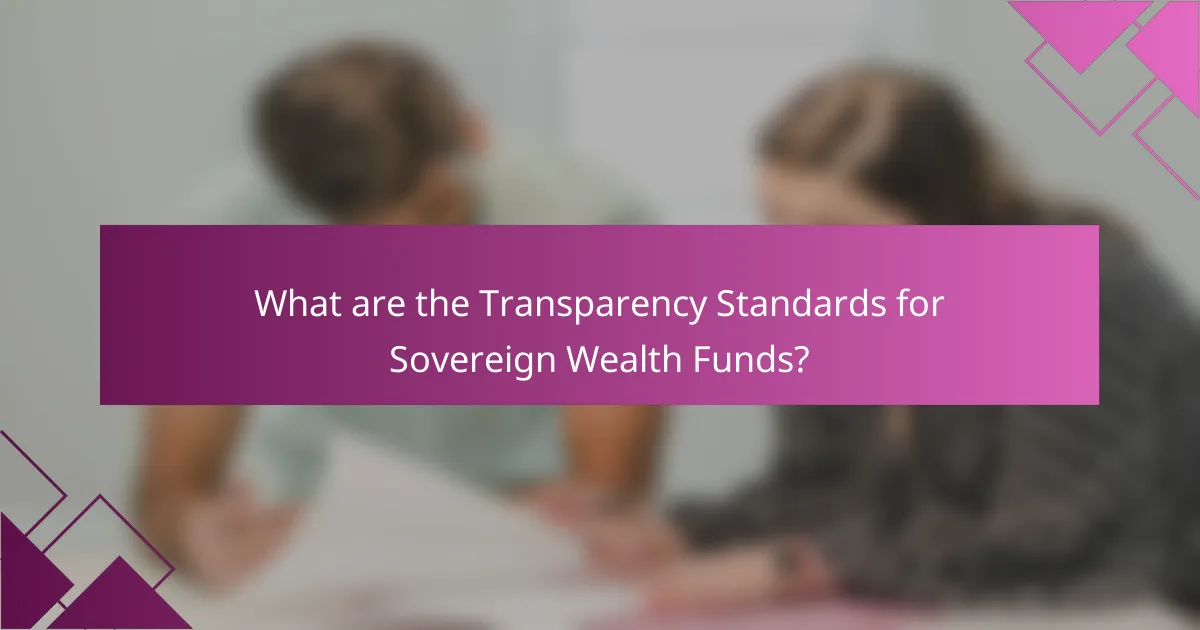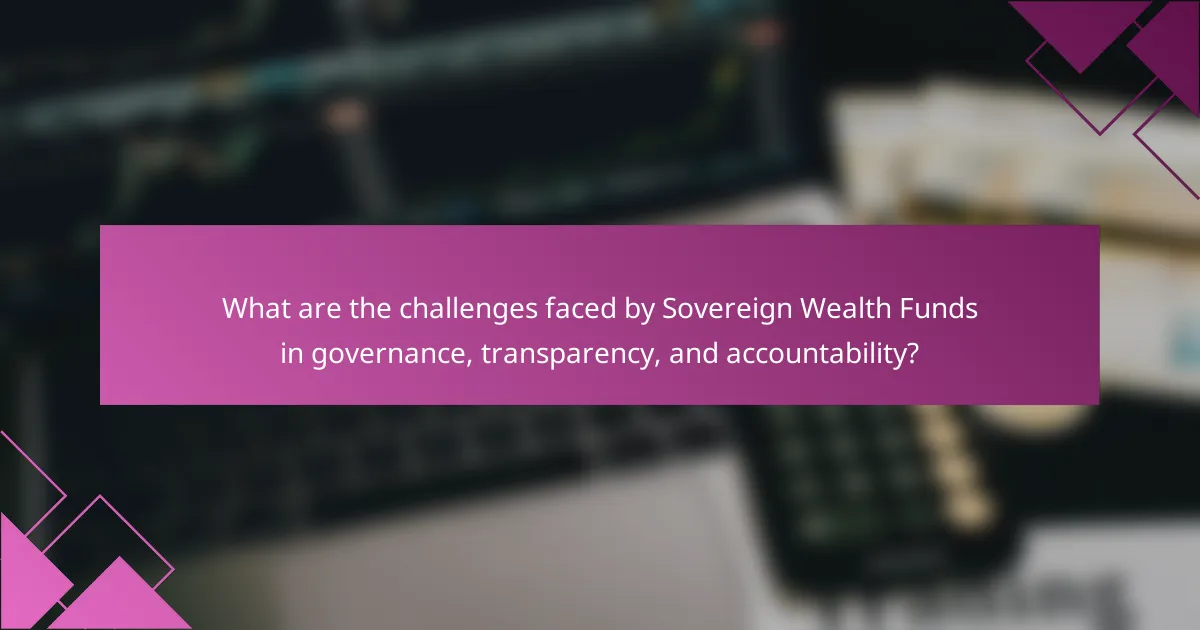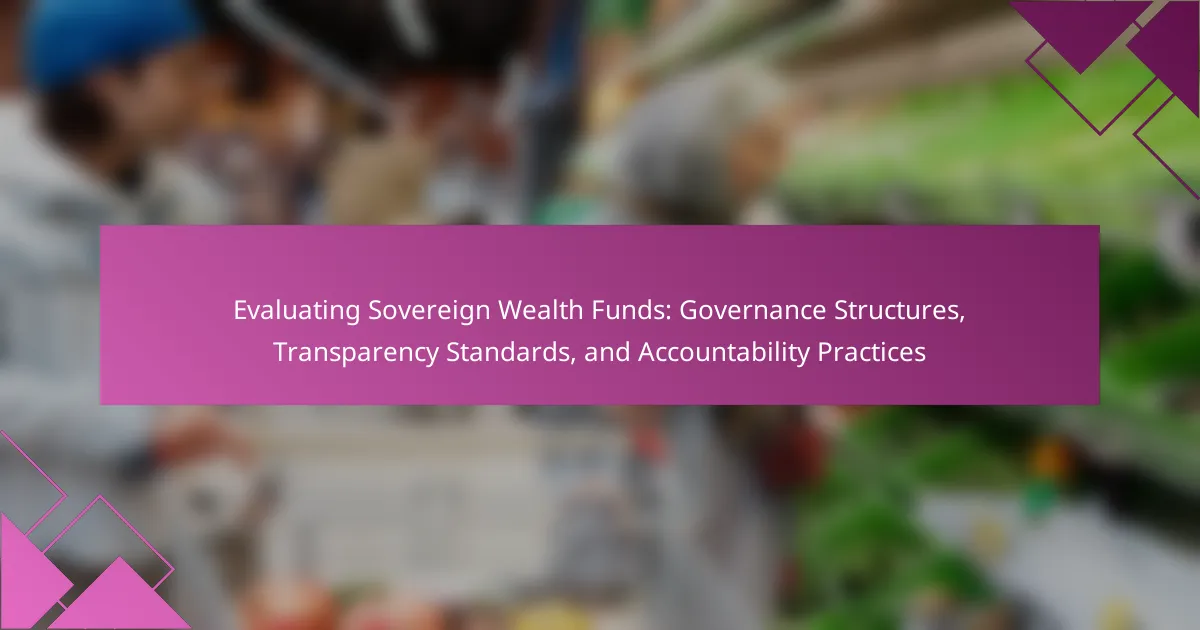
What are Sovereign Wealth Funds?
Sovereign Wealth Funds (SWFs) are state-owned investment funds. They invest national savings for various purposes, such as economic stabilization and future generations’ wealth. SWFs manage assets that can include stocks, bonds, real estate, and other financial instruments. As of 2023, global SWFs manage over $10 trillion in assets. These funds are established by countries to achieve financial goals and diversify income sources. The funds are often funded by surplus revenues from natural resources, such as oil and gas. Notable examples include Norway’s Government Pension Fund Global and the Abu Dhabi Investment Authority. SWFs are subject to governance structures that ensure accountability and transparency in their operations.
How do Sovereign Wealth Funds operate?
Sovereign Wealth Funds (SWFs) operate by managing state-owned investment portfolios. These funds invest in a variety of assets, including stocks, bonds, real estate, and commodities. SWFs are typically funded by revenues from natural resources, trade surpluses, or foreign exchange reserves. They aim to achieve long-term financial returns for their respective countries.
The governance structure of SWFs often includes a board of directors and investment committees. These entities oversee investment strategies and ensure compliance with regulations. Transparency standards vary among SWFs, influencing how they report performance and investment decisions. Accountability practices are essential for maintaining public trust and ensuring responsible management of national assets.
For instance, the Norway Government Pension Fund Global is recognized for its strong governance and transparency, regularly publishing detailed reports on its investments. This operational framework allows SWFs to contribute to economic stability and growth in their home countries.
What are the key components of Sovereign Wealth Fund operations?
The key components of Sovereign Wealth Fund operations include governance structures, investment strategies, risk management, and transparency standards. Governance structures define the decision-making processes and accountability mechanisms. Investment strategies outline asset allocation and diversification approaches. Risk management involves identifying and mitigating financial risks associated with investments. Transparency standards ensure that operations and performance are openly reported to stakeholders. These components work together to enhance the effectiveness and credibility of Sovereign Wealth Funds. For instance, the Norwegian Government Pension Fund Global is known for its robust governance and transparency practices, which contribute to its reputation and performance.
How do investment strategies differ among Sovereign Wealth Funds?
Investment strategies among Sovereign Wealth Funds (SWFs) differ based on their objectives and asset allocation preferences. Some SWFs prioritize long-term capital growth, while others focus on stabilizing national economies. For instance, Norway’s Government Pension Fund Global emphasizes ethical investments and sustainability. In contrast, the Abu Dhabi Investment Authority targets diversification across various asset classes. Additionally, some SWFs invest heavily in domestic infrastructure to support national development. Others, like Singapore’s GIC, adopt a more aggressive approach by investing in global equities and alternative assets. These differences also reflect varying risk tolerances and economic contexts. Overall, the distinct investment strategies of SWFs are shaped by their governance structures and the specific mandates set by their respective governments.
Why are Governance Structures important for Sovereign Wealth Funds?
Governance structures are crucial for sovereign wealth funds as they ensure accountability and transparency. These structures define roles, responsibilities, and decision-making processes. Effective governance mitigates risks associated with mismanagement and corruption. It fosters trust among stakeholders, including governments and the public. Studies show that well-governed funds tend to perform better financially. For instance, the International Monetary Fund emphasizes governance as a key factor in the success of sovereign wealth funds. Strong governance aligns the fund’s objectives with national interests, promoting sustainable economic growth.
What are the common governance models used in Sovereign Wealth Funds?
Common governance models used in Sovereign Wealth Funds include the centralized model, decentralized model, and hybrid model. The centralized model features a single authority overseeing fund operations. This model often leads to streamlined decision-making processes. The decentralized model allows for multiple entities to manage different aspects of the fund. This can enhance flexibility and adaptability to market conditions. The hybrid model combines elements of both centralized and decentralized governance. It aims to balance efficiency with diverse oversight. These models are shaped by factors such as national policy, investment objectives, and regulatory frameworks. For instance, Norway’s Government Pension Fund Global exemplifies a centralized governance structure. In contrast, the Abu Dhabi Investment Authority operates with a more decentralized approach. Each model has its advantages and challenges, impacting fund performance and accountability.
How do governance structures influence fund performance?
Governance structures significantly influence fund performance by establishing decision-making processes and accountability mechanisms. Effective governance can enhance investment strategies and risk management. For instance, funds with strong governance frameworks often demonstrate higher returns. Research shows that well-governed funds typically outperform their peers by 3% to 5% annually. This performance is attributed to better oversight and reduced agency costs. Furthermore, transparency in governance fosters investor confidence, leading to increased capital inflows. Studies indicate that funds with transparent practices attract 20% more investments. Thus, robust governance structures are crucial for optimizing fund performance.

What are the Transparency Standards for Sovereign Wealth Funds?
Transparency standards for sovereign wealth funds (SWFs) are guidelines that promote openness and accountability. These standards typically include regular reporting on investment strategies, financial performance, and governance structures. They aim to enhance the trust of stakeholders and the public. The International Working Group of Sovereign Wealth Funds established the Generally Accepted Principles and Practices (GAPP) as a framework for these standards. GAPP emphasizes transparency in operations and decision-making processes. Adhering to these standards can help mitigate risks of mismanagement and promote responsible investment practices. Many countries have adopted these principles to ensure effective governance of their SWFs.
How is transparency measured in Sovereign Wealth Funds?
Transparency in Sovereign Wealth Funds (SWFs) is measured through various standards and practices. One key framework is the Santiago Principles, which outline best practices for governance and transparency. These principles encourage SWFs to disclose information about their investment strategies, performance, and governance structures.
Another method of measurement is through the International Forum of Sovereign Wealth Funds (IFSWF) assessments. This organization evaluates SWFs based on their adherence to transparency and accountability guidelines.
Additionally, independent audits and reports can provide insights into an SWF’s operations and financial health. Regular public reporting on investment activities and financial statements also enhances transparency.
Countries with higher transparency ratings often attract more foreign investment. This correlation demonstrates the importance of transparency in building trust with stakeholders and the global investment community.
What frameworks exist for assessing transparency in Sovereign Wealth Funds?
The frameworks for assessing transparency in Sovereign Wealth Funds (SWFs) include the Santiago Principles and the International Forum of Sovereign Wealth Funds (IFSWF) framework. The Santiago Principles consist of 24 principles that promote transparency, accountability, and good governance. These principles were established in 2008 by the International Working Group of Sovereign Wealth Funds. The IFSWF framework further supports these principles by providing guidelines for best practices in governance and transparency. Both frameworks aim to enhance trust and stability in global financial markets. They encourage SWFs to disclose information on their investment strategies, risk management, and governance structures. Adherence to these frameworks is essential for fostering investor confidence and ensuring responsible investment practices.
How do transparency standards affect public trust?
Transparency standards enhance public trust by promoting accountability and openness. When organizations adhere to high transparency standards, they provide clear information about their operations and decision-making processes. This openness reduces uncertainty and builds confidence among stakeholders. Research shows that entities with robust transparency practices tend to experience higher levels of public trust. For instance, a study by the International Monetary Fund found that countries with transparent governance structures have better economic performance and greater public confidence. This correlation highlights the importance of transparency in fostering trust and legitimacy in public institutions.
Why is accountability crucial for Sovereign Wealth Funds?
Accountability is crucial for Sovereign Wealth Funds (SWFs) because it ensures responsible management of public assets. SWFs often manage substantial financial resources derived from national revenues. This management requires transparency to build public trust and confidence. Accountability mechanisms help prevent mismanagement and corruption. For instance, the International Forum of Sovereign Wealth Funds emphasizes the importance of governance frameworks. These frameworks promote ethical standards and responsible investment practices. When SWFs are held accountable, they are more likely to align with national interests. This alignment can lead to sustainable economic growth and stability.
What practices enhance accountability in Sovereign Wealth Funds?
Practices that enhance accountability in Sovereign Wealth Funds include robust governance frameworks, transparency in reporting, and stakeholder engagement. A strong governance framework establishes clear roles and responsibilities, ensuring decision-making processes are transparent and accountable. Regular and detailed reporting on financial performance and investment strategies fosters transparency. Engaging stakeholders, including the public and government entities, allows for external scrutiny and input, further enhancing accountability. Research indicates that Sovereign Wealth Funds with high transparency ratings tend to perform better and are more trusted by the public. For instance, the International Forum of Sovereign Wealth Funds emphasizes the importance of adherence to the Santiago Principles, which promote transparency and accountability.
How do accountability measures impact investment decisions?
Accountability measures significantly influence investment decisions by enhancing transparency and trust. Investors are more likely to engage with entities that demonstrate clear accountability practices. For example, sovereign wealth funds with robust governance structures often attract more capital. Research indicates that funds adhering to high transparency standards yield better performance. According to a study by the International Monetary Fund, funds with strong accountability mechanisms reported lower risks and higher returns. This correlation underscores the importance of accountability in fostering investor confidence. Ultimately, effective accountability measures lead to informed and favorable investment decisions.

What are the challenges faced by Sovereign Wealth Funds in governance, transparency, and accountability?
Sovereign Wealth Funds (SWFs) face significant challenges in governance, transparency, and accountability. These challenges include a lack of standardized governance frameworks across different funds. Many SWFs operate under varying regulatory environments, leading to inconsistencies in practices.
Transparency is often compromised due to limited disclosure requirements. Some SWFs do not publicly share their investment strategies or performance metrics. This opacity can lead to skepticism about their operations and motives.
Accountability issues arise when there is insufficient oversight from stakeholders. In some cases, SWFs are not held accountable for their investments, which can lead to mismanagement of funds. The absence of clear accountability mechanisms can diminish public trust in these entities.
Additionally, political influences can complicate governance structures. In certain countries, SWFs may be subject to political pressures that affect their decision-making processes. These factors collectively hinder the ability of SWFs to operate effectively and maintain public confidence.
How can Sovereign Wealth Funds improve their governance structures?
Sovereign Wealth Funds can improve their governance structures by adopting best practices in transparency and accountability. Implementing clear policies for investment strategies enhances decision-making processes. Establishing independent oversight committees can ensure impartial evaluations of fund performance. Regular audits by external parties increase trust and credibility among stakeholders. Engaging with international frameworks, such as the Santiago Principles, promotes adherence to global standards. Training board members in governance practices strengthens their ability to make informed decisions. Finally, fostering stakeholder engagement through regular communication builds public trust and support. These measures collectively enhance the effectiveness and integrity of Sovereign Wealth Funds.
What best practices can be adopted for better governance?
Implementing clear governance frameworks is essential for better governance. Establishing defined roles and responsibilities enhances accountability. Regular audits promote transparency and trust in operations. Stakeholder engagement ensures diverse perspectives are considered. Adopting international best practices aligns with global standards. Training programs for staff improve knowledge and compliance. Performance metrics facilitate objective evaluation of outcomes. Continuous improvement processes allow for adaptation and responsiveness to changing environments.
How can international collaboration enhance governance standards?
International collaboration can enhance governance standards by facilitating the sharing of best practices. When countries work together, they can learn from each other’s successes and failures. This exchange of knowledge helps to establish more effective regulatory frameworks. For instance, collaborative initiatives can lead to the development of standardized accountability measures. These measures increase transparency and reduce corruption risks. Research shows that countries with higher levels of international cooperation tend to exhibit stronger governance indicators. According to the World Bank, improved governance through collaboration can lead to better economic outcomes. Thus, international collaboration is essential for elevating governance standards globally.
What role does technology play in enhancing transparency and accountability?
Technology plays a crucial role in enhancing transparency and accountability. It enables real-time data sharing and reporting, which allows stakeholders to access information quickly. For instance, blockchain technology provides a secure and immutable ledger of transactions. This reduces the risk of fraud and increases trust among investors and the public. Additionally, data analytics tools help organizations monitor compliance with regulations effectively. They can identify anomalies in financial reporting, prompting timely corrective actions. Furthermore, online platforms facilitate stakeholder engagement by providing forums for feedback and discussion. This fosters a culture of openness and accountability. Overall, technology streamlines processes and promotes responsible governance in sovereign wealth funds.
How can digital tools improve reporting and accountability?
Digital tools enhance reporting and accountability by providing real-time data access and analysis. They facilitate streamlined data collection, reducing errors and increasing accuracy. Digital platforms enable automated reporting, which saves time and resources. Stakeholders can easily track performance metrics through dashboards. Enhanced transparency is achieved as data is made accessible to all relevant parties. Digital tools also support secure data sharing, ensuring confidentiality while promoting accountability. Blockchain technology can verify transactions, providing an immutable record. These innovations lead to increased trust among stakeholders in sovereign wealth funds.
What are the potential risks of relying on technology for transparency?
Relying on technology for transparency presents several potential risks. One major risk is data security breaches. Cyberattacks can compromise sensitive information, undermining transparency efforts. Another risk involves misinformation or data manipulation. If technology is misused, it can lead to distorted representations of facts. Additionally, over-reliance on automated systems may create a lack of human oversight. This can result in errors going unchecked. Furthermore, technology can exacerbate inequalities in access to information. Not all stakeholders may have equal access to digital platforms. Lastly, dependence on technology may lead to complacency in governance practices. This can weaken accountability measures that are crucial for effective oversight.
What are the best practices for evaluating Sovereign Wealth Funds?
Best practices for evaluating Sovereign Wealth Funds include assessing governance structures, transparency standards, and accountability practices. Evaluation should begin with a thorough analysis of the fund’s governance framework. This includes understanding decision-making processes and the roles of stakeholders. Transparency is crucial; funds should regularly disclose financial statements and investment strategies. Adherence to international best practices, such as the Santiago Principles, enhances credibility. Accountability mechanisms must be in place to ensure responsible management of assets. Regular independent audits can provide assurance of compliance and performance. Lastly, comparing performance against benchmarks can help gauge effectiveness. These practices contribute to a comprehensive evaluation of Sovereign Wealth Funds.
Sovereign Wealth Funds (SWFs) are state-owned investment funds that manage national savings to achieve economic stabilization and future wealth generation. This article evaluates the governance structures, transparency standards, and accountability practices of SWFs, highlighting their operational frameworks and the significance of effective governance in enhancing fund performance. Key components discussed include investment strategies, risks, and the impact of transparency on public trust. Additionally, the article addresses challenges faced by SWFs and best practices for improving governance and accountability through technology and international collaboration.
